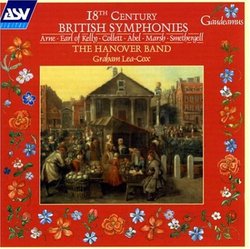| All Artists: Hanover Band, Lea-Cox Title: 18th Century English Symphonies Members Wishing: 0 Total Copies: 0 Label: Gaudeamus Release Date: 4/24/2001 Genre: Classical Styles: Historical Periods, Classical (c.1770-1830), Symphonies Number of Discs: 1 SwapaCD Credits: 1 UPC: 743625021622 |
Search - Hanover Band, Lea-Cox :: 18th Century English Symphonies
 | Hanover Band, Lea-Cox 18th Century English Symphonies Genre: Classical
|
Larger Image |
CD Details |
CD ReviewsPleasing, Civilised Sounds 09/12/2001 (5 out of 5 stars) "Grahm Lea-Cox continues to explore the byways of British music to the great advantage of all lovers of 18th century music. Here we have a collection of symphonies by composers most of whom will be new names to classical music fans. Two, Thomas Augustine Arne and the German transplant Carl Friedrich Abel, will be more recognizable, though they are hardly everyday names.Arne's contribution is a hearty, beef-and-potatoes effort that manages to sound British at the same time it obviously follows continental models; the Vivace is especially pleasant. Speaking of continental models, John Collett's work is influenced by the Manheim school and has a typical "rocket" theme in the first movement, along with some ingratiating solos for the horns and oboes that also recall Manheimer symphonies.Abel's symphony will remind one of J. C. Bach: gracious, sophisticated music with sauve melodies and treatments of them. Pleasant--but it must, like the other symphonies on this disk, give pride of place to the Conversation Sinfonie by John Marsh. Lea-Cox has recorded this music before, on an Olympia disk that I've not heard, but I can't imagine a more rousing performance than the one on this ASV disk. Perhaps the most British of all, with an Allegro finale that the liner notes rightly call a "hunting" movement, it employs two antiphonal orchestras, which gives the work its name. They converse most attractively in the first and second movements especially. The first movement is also the most fully worked-out on the disk, with a development section that actually rings interesting changes on the themes rather than just supplies a brief transition to the recapitulation. But it's the finale, propelled by bracing horns and drums, that truly makes this a memorable work.I've always thought the Hanover Band perhaps the best period-instrument groups around, but they outdo themselves in this music, with characterful solo work from the strings, liquid clarinet playing, and virtuoso performances from the horns. Wonderfully vivid, stereoistic sound rounds out a package that I can't recommend enough."
|

 Track Listings (19) - Disc #1
Track Listings (19) - Disc #1